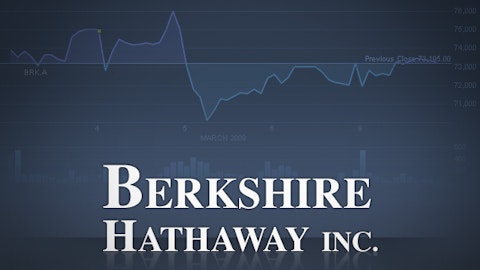

Source: The Nilson Report issue 992 via Visa 10-K for 2012 .
But does this really mean anything? As my fellow Fool Morgan Housel recently pointed out, Visa’s credit cards in circulation are essentially unchanged from 2009 (although debit cards continue to grow in number). Credit card debt per capita in the United States is also lower than it’s been since 1996. This should be very bad news for Visa and fellow payments processors Mastercard Inc (NYSE:MA), American Express Company (NYSE:AXP), and Discover Financial Services (NYSE:DFS), which all draw from the same pool of consumers, and which tend to benefit from the expansion of credit debt outstanding.
What matters, though isn’t just volume, but the quality of that volume. My Foolish collaborator Sean Williams notes that both Visa Inc (NYSE:V) and Mastercard Inc (NYSE:MA) avoid the negative consequences of delinquent or doubtful accounts because neither serves as a direct lender, acting instead as solely a payment processor. To see how important this is to the financial health of the card issuer, just look at the relative stock performance of each of the four companies through the worst part of the financial crisis:

V Total Return Price data by YCharts.
This is pretty much what you’d expect. Visa Inc (NYSE:V) and Mastercard Inc (NYSE:MA) avoid the worst of the financial consequences, gaining share values roughly approximating their respective global market positions. The post-crisis period produced a more modest rebound in Visa’s fortunes than that experienced by most of its peers, but it was a better preserver of capital through a shaky market period to begin with.
Visa doesn’t look cheap compared to its peers on standard valuation metrics, but a big part of that is because of a one-time settlement charge that will fall off the books by the end of this year. When adjusting for that charge to better reflect normal operating procedures, Visa looks a lot more reasonable:
| Card Issuer | P/E * | Price to Free Cash Flow ** | 2014 EPS Growth Estimate |
|---|---|---|---|
| Visa | 27.2 | 22.6 | 16% |
| MasterCard | 24.3 | 21.1 | 18.5% |
| American Express | 17.7 | 7.5 | 9.8% |
| Discover | 10.0 | 6.7 | 2.1% |
Sources: YCharts, Yahoo! Finance, and Visa earnings reports.
*Visa earnings for trailing 12 months adjusted to remove $4.1 billion litigation provision and recalculated based on 2011 tax rate .
**Visa free cash flow for TTM adjusted to remove $4.1 billion litigation provision .
In general, these numbers all line up well. Visa Inc (NYSE:V) is the top dog in payment processing and is afforded a much higher growth rate than the two lender-processors, which explains the discrepancy in valuations even after accounting for the one-time charges. There’s every reason to expect Visa to continue to grow, as the United States still accounts for an estimated 40% of global non-cash payments volume , despite accounting for only 20% of global GDP . Credit cards account for roughly 60% of all non-cash payments in mature Asian and North American markets, but less than 40% in the BRIC countries and in Europe. Keep in mind that cash is still the predominant payment method around the world.
In the long run, it makes more sense to bet on the growth of credit cards, as long as you anticipate the expansion of a strong consumer culture throughout the world. Visa Inc (NYSE:V) has the best position from which to drive that expansion, so it makes sense that its growth opportunities would be reflected in premium pricing.
The article This Credit Card Industry Leader Still Has Great Global Opportunities originally appeared on Fool.com and is written by Alex Planes.
Fool contributor Alex Planes holds no financial position in any company mentioned here. Add him on Google+ or follow him on Twitter @TMFBiggles for more insight into markets, history, and technology.The Motley Fool recommends American Express, MasterCard, and Visa. The Motley Fool owns shares of MasterCard.
Copyright © 1995 – 2013 The Motley Fool, LLC. All rights reserved. The Motley Fool has a disclosure policy.


